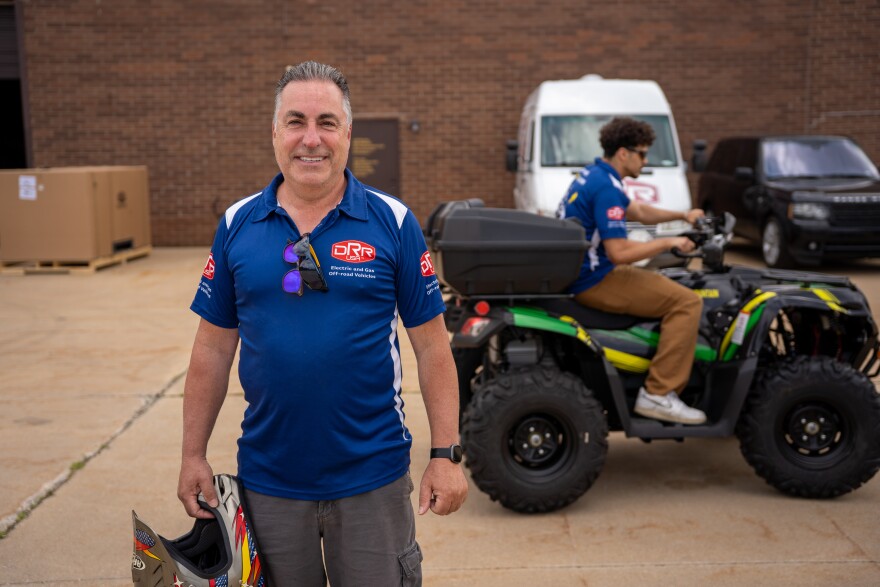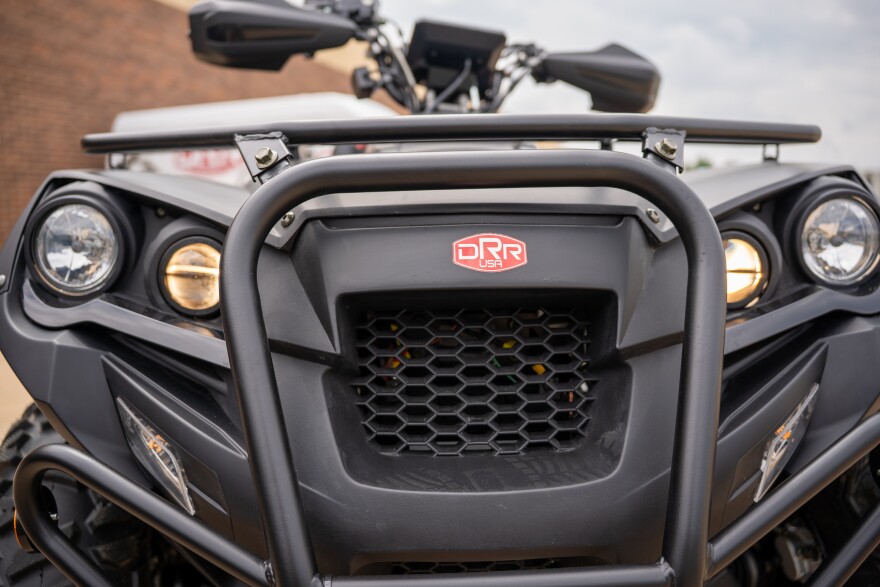In 2000, Kim and Lou Decuzzi began making their mark in ATV racing for kids with a gas-powered vehicle that featured innovative performance and safety features.
These days, their company, DRR USA in Brunswick, is again at the forefront of innovation with adult electric all-terrain vehicles that customers value for their quiet operation, low maintenance and zero carbon emissions. The customer list includes vineyards, farmers, hunters, governments and eco-tourism businesses in and outside the United States. Last year, DRR was named a U.S. Chamber of Commerce Top 100 Small Business of the Year for its work “setting new industry standards for safety and sustainability while expanding into international markets and advancing environmentally responsible off-road solutions.”
DRR, short for Dirt Road Riding, is bursting at the seams of its 10,000-square-foot space in an industrial park east of Interstate 71. The small company’s evolution is a testament to hard work, timing, and the importance of connecting with the area’s small business development network. In the Decuzzis’ case, that included an export business accelerator at Cleveland State University.
Lou Decuzzi, a New Jersey native who’s quick with a quip and a grin, captures the small company’s plucky culture when he says, “I’m smart enough to know what I’m doing but dumb enough to think I can do it.”
Lou grew up with a passion for racing and tinkering with go-karts and dirt bikes. He and Kim rode with and encouraged their three sons to get into go-kart and ATV racing. That meant watching them in competitions, including one in which their oldest son was injured.
Safety first
That got Kim thinking: Can’t high-performance ATVs for kids be built more safely? Outside their corporate jobs, the Decuzzis began to research and build ATVs with lower seats, wider bases and better handling. Other parents asked about buying them. Kim quit her job to launch DRR in 2000 and Lou joined soon after, with the company initially immersed in off-road racing. The youths driving their gas-powered, high-performance dirt bikes and ATVs – known as mini-ATVs and mini-quads – began pulling down championships nationwide.
“We knew how to break things and make them better, right?” Lou Decuzzi said of the constant tinkering and design advances in their off-road vehicles for youths. “There's a ton of aftermarket support out there from small race shops all over the country, which is a big plus. It's like we're the Ferrari of kids’ mini-ATVs.”
Josh Lane, owner of Mud Motorsports, an ATV dealer in Martinsville, Indiana, that caters to ATV and dirt bike racers, confirmed that DRR mini-quads are considered a top performer. “If you’re going to go to a national event … they are all on DRRs,” said Lane, whose own children raced on DRRs when they were younger.
Over the years, DRR’s gas-powered product line grew beyond racing to include ATVs for adults, utility terrain vehicles and motorcycles. But the business took an unexpected turn when a search-and-rescue need arose in rural North Carolina in 2018.
The DeCuzzis watched media coverage of a lost boy with autism and believed the din of ATVs, helicopters and search equipment could startle the boy into hiding. Kim asked if Lou could convert a gas-powered ATV to electric power to run more quietly. Lou quickly adapted a battery from a next-door business that reconditions batteries for forklifts. The boy, unfortunately, didn’t survive, but the Decuzzis reached out to North Carolina safety officials to get their perspective on quieter ATVs.
Encouraged by the response, the Decuzzi’s continued developing their electric ATV, believing it would be a boon for public safety and military purposes. Red Bull, a sponsor of off-road racing, posted a story about DRR’s electric venture in May 2019.
“They put it on their (website) main page and tweeted about it,” Lou Decuzzi said. “Within five minutes, we had 25,000 hits on our website.” They saw a fledgling yet viable market – few ATV manufacturers had explored electric power, despite the growth of electric vehicles in the auto industry.

Electric ATVs generally can be several thousand dollars more expensive than gas-powered. But EATVs are cheaper to maintain, with many fewer parts, and have zero emissions. Electric motors deliver instant torque but power can drop as batteries drain. Gas ATVs have higher top speeds, a wider range and the convenience of gas refueling, compared to EATVs, which need time for battery recharge.
Believing pros outweighed the cons for their targeted markets, the Decuzzis jumped into EATV production. But they quickly ran into supply problems with lithium-ion battery manufacturers who were overseas. “The EATV market did not exist and getting suppliers to do small batch runs is very difficult,” Decuzzi said.
“So no one wants to do 18 or 20 pieces for you,” said Decuzzi. “So that was the most difficult challenge.”
Other challenges included governmental red tape and the business-killing effect of the COVID-19 pandemic, which knocked out a significant amount of pre-sales, DeCuzzi said.
Flourishing overseas
Dealing with overseas markets led the Decuzzis in 2022 to the GlobalTarget Program, an export accelerator for small businesses created 20 years ago and operating at the Monte Ahuja College of Business Global Business Center at Cleveland State University.
Each year, 10 businesses doing at least $2 million in annual sales pay to join a seven-month program that supplies mentors, market analysis, business strategy, and a trade mission, as well as workshops and subject experts. The program taps resources from the Ohio Small Business Development Center Export Assistance Network, the U.S. Commercial Service and other regional and international organizations.
Nathan Ward is the GlobalTarget director and a trade advisor for the state of Ohio. He said DRR paired with a mentor who was a supply chain manager at Lubrizol, who helped the Decuzzis tackle their supply chain challenges.
Ward oversaw a global market study for DRR that identified eco-tourism as a potential market. The EATVs’ quiet, pollution-free operation are a plus for sensitive ecological areas. “You’re not going to spook animals that are around,” Ward said. “Not only that, but the operators don’t have to fiddle with the messiness of fuel and things like that.”
DRR recently sold 28 of its Safari EATVs (priced at $14,999 on the website) to Mystic Mountain adventure park in Jamaica, which offers ATV eco-tours. The Safari’s four-wheel drive makes it a popular choice for tackling trails and steep terrain. The park was an early DRR customer, having purchased its first batch of EATVs five years ago.
Park General Manager Dewald van der Walt said a DRR employee spent several days on site instructing employees, riding the rainforest trails and troubleshooting any problems. The Mystic Mountain EATVs are custom made, with larger batteries that accommodate power steering and a 65-mile range before charging. For tourist safety, the vehicles are fitted with fenders and limited to a top speed of 25 mph.
Van der Walt, who came to the park in 2023, said he was initially skeptical of EATVs. “There are not very many manufacturers of electric ATVs,” he said. “There are very few available that seem to be a good quality unit. In our view, DRR USA is one of the best. … They are performing very well and reliably.”
Besides the market analysis, CSU’s GlobalTarget program hooked DRR up with the Ohio Export Internship Program, which covers half the salaries for interns to help small businesses with overseas markets. That brought CSU graduate Rosalina Keglovic to DRR in 2022, and she has since joined the company full-time as an International Business Specialist.
DRR is doing a second, seven-month stint with the GlobalTarget program and is using intern Elijah Pearson, a Baldwin Wallace University student, to analyze potential distributors and markets in Mexico.
Decuzzi said interns have done vital work for DRR. “It's such a low cost for such a high-value program, right? It's crazy,” said Decuzzi, who has helped lure other small businesses to the GlobalTarget program.
The Decuzzis have taken advantage of other business-development programs in and outside the area, including the Goldman Sachs 10,000 Small Businesses program through Cuyahoga Community College and the Entrepreneurs Organization, an international support network for business owners.
DRR’s future – and challenges
The popularity of EATVs has surprised even the Decuzzis. In recent years, EATVs have gone from 20 percent of the company’s overall sales to 60 percent. DRR had 500 pre-orders for its products, Decuzzi said in late May, with the ability to assemble up to 18 gas- and electric-powered vehicles a week. The company has eight full-timers and uses a contractor to supply an assembly crew.
Sometimes, assembly is done in the parking lot outside their cramped industrial space in Brunswick. A top priority is finding more room, but high interest rates and soaring prices for commercial square footage are a challenge, Decuzzi said.
“There’s a lot of inefficient movement here,’’ Decuzzi acknowledges. “We keep looking.”
Competition is rising as ATV makers move into electric power. The global market for electric all-terrain or utility terrain vehicles is expected to increase by double digits annually into the 2030s, according to several industry and market research reports.
Decuzzi described DRR as the scrappy underdog in the EATV market. “We work weekends and overnights,” he said. Engineers with large competitors “make too much money, and they leave at 2 o’clock on a Friday. If we don’t finish our stuff, we don’t eat.”
Tariffs are the latest challenge. Larger competitors can better handle tariffs set by President Donald Trump’s administration. “It means a cost increase of maybe 30 percent,” Decuzzi said. “We’re not big enough to absorb it, so it means prices will be going up.”
Small companies like DRR have few choices when it comes to tariffs, GlobalTarget’s Ward said.
“The only way for them to cut costs is by laying people off,” Ward said. “It hurts their ability to function, so they’ll have no choice but to pass those costs onto the consumer.”

The Decuzzis considered retiring earlier this year but decided to go after opportunities in the electric ATV market, Lou said. There have been offers to buy the company from some suppliers and government contractors, Decuzzi said. “They haven’t been what we would go for,” he said.
For now, DRR has found a niche offering quality products and personal service, Ward said.
“They can have wins and gain satisfied customers in places where the big people can’t give that level of attention,” Ward said. “The biggest companies can’t be everywhere all the time.”



